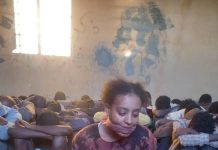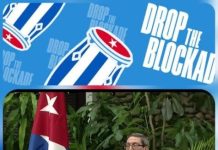As sport representatives from 54 African countries are gathering this week in Djibouti for the General Assembly of the Association of National Olympic Committees of Africa, it is a decisive moment for the Africa to draw up a winning strategy. A strategy that would allow to capitalize on the continent’s historic 45 medals at the Rio 2016 Games and to see its athletes shine again in three years’ time in Tokyo. The resolutions made at the ANOCA GA this week will not only shape the stance of the African sport over the next years, but they will also have a significant impact on the Olympic Movement’s development around the world.
In the meantime, another key decision determining the face of the international sport for the years to come will be taken on September 13th some 13,000 km away from Djibouti, as the International Olympic Committee members will come together in Lima to select the host of the 2024 Olympic and Paralympic Games.
Why does this other decision matter for Africa?
First of all, the September vote will put forward a partner that the African sport bodies will closely deal with in the next 7 years while building its own positive future – and this, starting as soon as on September 14th.
The United States Olympic Committee has just celebrated the 10-year anniversary of its ground-breaking partnership with the ANOCA family aimed at developing sport throughout the African continent from the grassroots to the elite level. USOC’s activities demonstrate the United States sports community’s commitment to supporting the development of African sport – – be it through the International Coaching Enrichment Certificate Programme where 49 coaches from 25 African countries have already graduated from; through athlete scholarships and training opportunities; through equipment and apparel donations; through support with staging major sport events such as the 2014 African Youth Games in Gaborone, Botswana; or through establishing a cloud communications system allowing all 54 African NOCs to collaborate in an enhanced way. This commitment has been an inspiration to LA 2024 as we seek to put forward a Games plan with a lasting global impact, and it has also provided us with invaluable insights about the needs and priorities of African NOCs.
We would be far from starting this new cooperation in September from scratch, as we have already achieved a great deal together and we have a real potential to achieve so much more in the decade to come.
Secondly, ensuring that the athletes have access to the best facilities and services to train and achieve their best results is the ultimate goal of every National Olympic Committee and National Paralympic Committee, and this is also what the September vote relates to.
The United States have one of the best networks of world-class venues and high-performance training facilities in the world. Indeed, many sport legends from across Africa have already benefited from the US college system integrating some of the best of these facilities as they were able to pursue their Olympic dreams while getting an education. At the Rio 2016 Olympic Games alone, over 1,000 athletes from 107 nations – including many from Africa – were either current or former student athletes of the US National Collegial Athletic Association (NCAA) system.
Providing National Olympic and Paralympic Committees with access to coordinated pre-Games training opportunities, acclimatization camps and services, such as sport medicine, ahead of the Tokyo 2020 Games and leading into the 2024 Games is an integral part of the Los Angeles 2024’s commitment. As part of this commitment, facilities such as The Chula Vista Olympic Center will be available to African athletes before and beyond the Games as an international training center. LA 2024 will therefore help African athletes begin the Games better prepared and contribute to further improving African countries’ medal standings.
All permanent venues required for the 2024 Games are already in place in Los Angeles and the Games will be 100% privately funded. It means that we will be able to fully dedicate the 7 years of preparations to the NOCs’ and NPCs’ experience and to special projects such as the LA 2024 Athlete Transition Programme aimed at providing athletes with education and professional opportunities, rather than to construction and to managing financial surprises.
Finally, at this critical time for the Olympic Movement, the vote on the 2024 host will determine what the Games will look like and what place they will have in the world ten to twenty years from now, when Africa’s ambition to host the continent’s first-ever Olympic and Paralympic Games might become a reality. For that to happen, we believe that collectively we must demonstrate it is possible to host a spectacular Games in a financially responsible and truly sustainable way. Los Angeles provides a unique opportunity for the entire Olympic and Paralympic Movement to secure a sustainable future by engaging with a $250 billion-dollar sports market and accessing an intersection of new media, technology and entertainment found only in California.
ngeles is America’s most diverse city, where nearly 40% of the population was born outside the US. It is our dream to be able to provide our colleagues at ANOCA in 2024 a home field advantage away from home with the warmest welcome from our 144 international communities. But above all, we would be proud to contribute, through LA 2024 programmes, to the bright future of the African sport – and this, not in a few years, but, we hope, just in a few months.
Written by Casey WASSERMAN, Chairman, Los Angeles 2024 Olympic and Paralympic Bid Committee, and Larry PROBST, Chairman, Unites States Olympic Committee



















